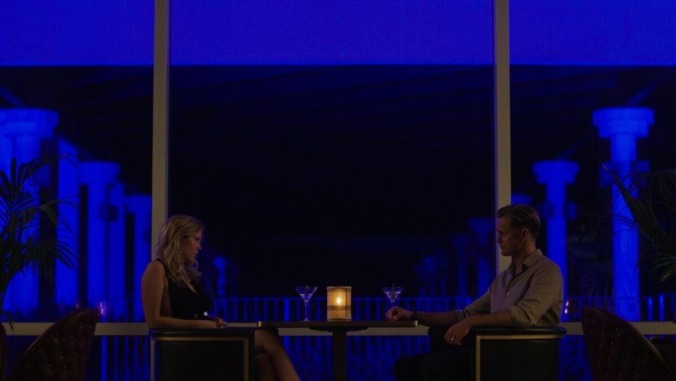Mia Goth and Brandon Cronenberg know why you love to be scared
The Infinity Pool star and director discuss the dark side of acting and why their film has been called The White Lotus Goes To Hell

Photo: Neon
It’s the collaboration horror fiends have been dying for. Infinity Pool brings together the awesome Mia Goth, a scream queen (Suspiria, X, and Pearl) blessed with the acting chops of any current Oscar nominee, and Brandon Cronenberg, the writer-director who freaked out audiences with Antiviral and Possessor. To be sure, Infinity Pool—the result of the first team-up between the British actress and the son of legendary director, David Cronenberg—delivers the mind-blowing, squirm-inducing, cover-your-eyes goods, and then some.
Now in theaters, Infinity Pool centers on James (Alexander Skarsgard) and Em Foster (Cleopatra Coleman), a wealthy, struggling couple who travel to a ritzy foreign resort for a much-needed vacation. He authored a badly reviewed book and can’t muster a sophomore effort, and it’s dragged down the couple’s marriage. The trouble starts when they meet Gabi (Goth) and Alban (Jalil Lespert), and join them on a taboo trip off the heavily guarded premises. That results in James hitting a man with the group’s car, and in this country that means the death penalty, with the punishment meted out by the victim’s son. Only, in this poor place, the rich can buy their way out of trouble–by paying for a clone to be made and die for them. The catch? You have to watch. The question? Is it the clone or the real person who actually dies?
Now all but invincible, James falls prey to his worst instincts and self-doubts, and he’s not the only one at the resort in the same position. Cue, well, everything you can imagine: grisly murders, goopy resurrections, lurid orgies, mutilated body parts, dripping bodily fluids, adults breastfeeding and more, much of it captured in unflinching close-ups and driven home with a loud, driving score. Infinity Pool earns its NC-17 rating and a likely place in the body horror film pantheon. The A.V. Club caught up with Goth (energetic and detailed) and Cronenberg (soft-spoken and detailed) for a conversation about the film. Here’s what they had to say.
The A.V. Club: What’s your take on why moviegoers love horror? What’s the pleasure people take in being scared by a movie?
Mia Goth: People are desperate to feel something. With the horror genre, one of the many reasons why it’s so popular is because it’s almost a surefire way to arouse something within you. It’s our modern-day version of going to a gladiator game, for example. It’s an experience. It’s something that people can enjoy together as a community and have that shared experience with one another. In our day-to-day life, that’s becoming increasingly rare, actually. You wake up in the morning—you’re on your phone, you’re in the car, or you might be in your office—and you can quite easily fall into a state of constant numbness. That’s one of the reasons why.
Brandon Cronenberg: There’s a catharsis to it. I’m sure adrenaline plays a certain part in it, but to go through this process of fear and then release is cleansing for people. With horror, they can operate it as a laboratory to explore certain difficult emotions in a safe environment. You can go to dark places and connect with aspects of the human psyche, as well as the emotional spectrum, that you might want to avoid in real life. In that context, art becomes very enriching. We’re richer people if we explore all aspects of the human experience.
AVC: Mia, back to you on that. From the actor side of that equation, you’ve come back to horror multiple times in your young career. Do you like to scare people? Do you like to go to dark places as a performer? Is it a bit of both, and maybe even more?
MG: I don’t necessarily like to scare people. To be honest, I’m never thinking about an audience when I’m doing my work. I try to stay out of the result entirely, of what the film may be. If you start doing that, with your work and what you’re trying to achieve, you’re being motivated by the wrong reasons. A lot of the films that I do—even this, for example—I don’t necessarily consider them to be horror movies. The genre is ever-expanding, and it’s starting to include various films. It’s where I’ve been able to find the best roles, with a lot of opportunities for me as a performer and an actor, to explore various facets of myself. I like challenging material. I enjoy characters and directors that push me. It’s also an incredibly thrilling and freeing experience being able to exercise these facets of myself in a safe space.
 Keep scrolling for more great stories.
Keep scrolling for more great stories.
